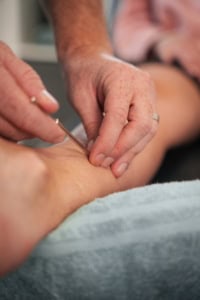Acupuncture in Glasgow’s West End (Finnieston)
Evidence-Based Acupuncture Delivered by Chartered Physiotherapists
At our Finnieston clinic (formerly K.M. Woods Physiotherapy), we offer evidence-based acupuncture as part of an integrated physiotherapy treatment plan. Our physiotherapists are trained in modern medical acupuncture — using fine, sterile needles to stimulate the body’s natural pain-relieving responses and support tissue healing.
While acupuncture has its origins in traditional Chinese medicine, its use within physiotherapy is grounded in clinical research. Stimulation of specific points helps to:
-
Reduce muscle tension and spasm
-
Improve local blood flow
-
Modulate pain signals
-
Release endorphins and natural anti-inflammatory chemicals
-
Support recovery from musculoskeletal conditions
What can acupuncture help with?
Physio-led acupuncture can be effective for:
-
Neck and back pain
-
Shoulder and rotator cuff conditions
-
Tennis elbow
-
Hip and gluteal pain (including piriformis syndrome)
-
Knee pain, including arthritic symptoms
-
Muscle tension and myofascial trigger points
-
Whiplash-related pain
-
Generalised muscular tightness or overload
Our physiotherapists assess each patient individually and determine whether acupuncture will meaningfully support your recovery.
What to expect during treatment
During a session:
-
Single-use sterile needles are inserted into targeted points
-
You may feel a warm, heavy, tingling or “De Qi” sensation — this is normal and indicates therapeutic activation
-
Needles typically remain in place for 15–20 minutes
-
The physiotherapist may gently stimulate the needles to maintain treatment effect
-
Sessions are comfortable and most patients report a sense of relaxation afterwards
How many sessions will I need?
Treatment frequency varies based on your condition and response. Research often recommends 6–10 sessions, but many patients notice improvements much sooner — sometimes after just one or two treatments when combined with physiotherapy.
Is acupuncture safe?
Acupuncture performed by chartered physiotherapists is considered very safe.
Possible but uncommon side effects include:
-
Mild drowsiness
-
Temporary light-headedness
-
Small pin-point bruising
Your physiotherapist will explain any risks relevant to you before treatment begins.
Part of the Carter & George approach
As we transition from K.M. Woods to Carter & George, acupuncture remains one of the evidence-based tools we use to reduce pain, restore movement and accelerate recovery. This service sits within a wider, data-driven physiotherapy model designed to help us become the number one physiotherapy clinic in Glasgow — without losing the personal, trusted care this clinic has always been known for.
Where we are
Acupuncture is available at our Glasgow West End clinic:
15 Royal Crescent, Finnieston, G3 7SL

